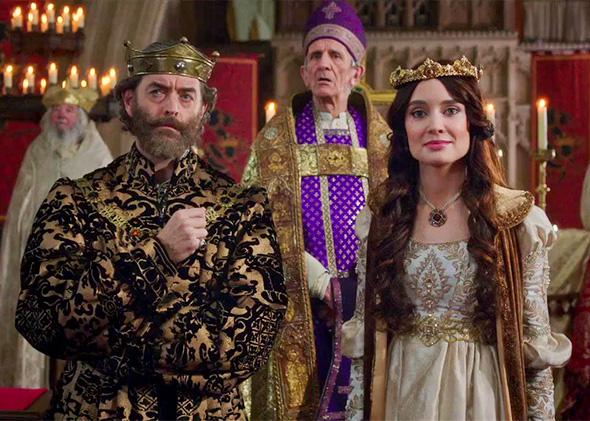If you are looking for something strange and new to watch, there is no better candidate than Galavant, the fairy tale musical comedy beginning this Sunday on ABC. This is, without question, the oddest show to arrive on television in quite some time. Set in a fantasy realm in the Middle Ages, it tells the story of Galavant, a swashbuckling hero who must get his mojo back after his true love abandons him. The music and lyrics come from Dan Fogelman and Disney experts Alan Menken and Glenn Slater, but there is not one moment of Disney-musical earnestness in the first six episodes. “He wowed in every way, a fairy tale cliché,” goes a line in the opening number about Galavant’s former prowess, and that is just the beginning of the series’ consistently cheeky, hammy, self-aware, Spamalot-inspired tone. Galavant may be unapologetically musical, but it is not an entirely unapologetic musical: It mocks its own tropes—those borrowed from musicals and those lifted from fairy tales—every chance it gets.
As the show begins, Galavant (Joshua Sasse) has been jilted by his one true love, Madalena (Mallory Jansen), who has chosen to marry the cruel, infantile, clueless King Richard (Timothy Omundson) and be rich and famous instead. Galavant has taken to drinking and sleeping and stinking, all while maintaining a perfectly manicured beard. Meanwhile, King Richard has conquered the realm of Valencia, famous for its cabbage and a really big jewel, which Madalena is keen to get her hands on. Princess Isabella of Valencia (Karen David), whose parents are being held prisoner by Richard, sets off with the jewel to find Galavant. She tells him she needs his help rescuing her nation, her parents, and his true love Madalena, but she is, in fact, following Richard’s instructions to lure Galavant to Valencia, where Richard will set her parents free and kill Galavant.
The first six episodes of the show track Galavant and Isabella, and Galavant’s squire, Sid (Luke Youngblood), a black man adopted by two very Jewish parents—he makes liberal use of the word plotz—as they make their way to Valencia. (The trio, a white guy, a black guy, and a woman of “Chinese, Indian and a sliver of Jewish heritage,” sing about how they’re “gorgeous, and very diverse.”) In one episode, Galavant enters a jousting contest, in which he faces off against Jean Hamm (say it out loud with a French accent), played by John Stamos. Jean Hamm greets Galavant by saying, “Nice beard. I’m talking about [Princess Isabella], of course. But not bad facial hair either.” By the time the two joust, Jean Hamm is so hung over on absinthe and Galavant is so sore from his training regimen they just fall off their horses. In another episode, Galavant comes across a group of pirates, led by Downton Abbey’s Hugh Bonneville, whose ship has been beached for months: “We’re lords of the sea, though technically next to the sea,” they sing. Weird Al shows up as a Valencian monk, who has taken not a vow of silence, but a vow of singing. Meanwhile Richard is taking comedy lessons from the Jester, who is bedding Madalena. Richard’s idea of funny is to have everyone kick a eunuch in the balls he doesn’t have over and over again.
All of these antics, individually amusing as they may or may not be, add up to something numbing: Punch line after punch line after punch line, with no real emotion, will knock you out after a while. Galavant has gotten so many of its very-high-degree-of-difficulty aspects almost right. It is an entirely un-embarrassing, cringe-free, professional production, which is more than one might reasonably expect from a musical that features Ricky Gervais in a guest spot as Xanax the Magician. The music may be so innocuous as to resist hummability, but the lyrics are sharp, the premise is wacky and freeing, the actors are game and self-lampooning, and somehow this made it to network television. Yet Galavant has neglected the most basic elements of story-building, the emotional ballast that makes audiences care about characters, whether they are singing or not. The characters are such cartoonish goofs, they barely seem to have feelings. The series keeps telling us that Isabella and Galavant might be falling in love, but they never show it. That would probably require an earnest love song, and Galavant doesn’t do earnest, an entirely self-defeating strategy: People who like musicals, the only audience Galavant will ever have, aren’t put off by sincere emoting from time to time.
One obvious contrast here is with The Princess Bride, which was not a musical, but mixed the ridiculous and mythic elements of fairy tales to great effect. Westley and Buttercup’s passion for one another may have been the most embarrassing, least innovative thing about the film, but it grounded all the surrounding hijinks, gave them weight, urgency, internal logic. Galavant is too insincere to do the same for any of its stories. It doesn’t matter if Galavant and Isabella are in love, if Isabella’s parents are murdered, if Galavant is shafted by Madalena again: That’s all just material for semi-clever song lyrics. Watching Galavant, it is impossible to forget that you are watching a curio, an experiment, an awesomely oddball thing ABC is willing to do, because, at this moment, it is willing to do anything. Unlike the best musicals and fairy tales, it never once transports you to a land far, far away.
